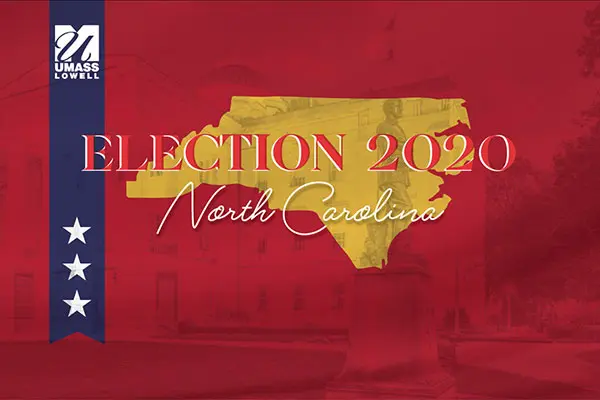Senator holds narrow edge over Bloomberg with likely voters

02/20/2020
Contact: Christine Gillette, 978-934-2209 (o), 978-758-4664 (c), or Christine_Gillette@uml.edu or Nancy Cicco, 978-934-4944 or Nancy_Cicco@uml.edu
U.S. Sen. Bernie Sanders has the most support among likely voters in the North Carolina Democratic primary, according to a new poll released today.
Sanders has the support of 23 percent of likely voters, followed by former New York Mayor Michael Bloomberg with the support of 19 percent of likely voters. Former Vice President Joe Biden is in third with 16 percent, followed by U.S. Sen. Elizabeth Warren at 13 percent, former Mayor Pete Buttigieg at 10 percent, U.S. Sen. Amy Klobuchar at 7 percent, U.S. Rep. Tulsi Gabbard and businessman Tom Steyer are tied at 3 percent and 6 percent of likely voters are undecided.
Detailed poll results – including candidates’ support by age and other categories, along with topline and methodology – are available at www.uml.edu/polls. The nonpartisan poll is independently funded by the University of Massachusetts Lowell’s Center for Public Opinion, which conducts public-opinion polling at the state and national levels. The internationally recognized center uses the latest technology and highest standards in its surveys and is a member of the American Association for Public Opinion Research’s Transparency Initiative. The center’s events and polls on political and social issues provide unique opportunities for civic engagement, experiential learning and research.
With North Carolina’s primary on Super Tuesday less than two weeks away, 34 percent of likely voters said they could still change their minds compared to 66 percent who said they are firm in their support of their chosen candidate. Sanders has the strongest base, with 82 percent of his supporters saying they will definitely vote for him. This is 13 points higher than the vote certainty for Bloomberg, who is at 69 percent, and is followed by Biden and Steyer at 63 percent, Warren at 60 percent, Buttigieg at 59 percent, Klobuchar at 56 percent and Gabbard at 21 percent.
“What’s clear from this data is that Joe Biden is campaigning hard in South Carolina when he should be campaigning hard in North Carolina. His supporters are far less stalwart here than just one state over. There’s also a narrow lane, unlike in other states, for Elizabeth Warren to pivot her debate performance into a stronger finish. Despite being fourth in the survey, she’s the top-rated second choice candidate in the poll,” said John Cluverius, associate director of the UMass Lowell Center for Public Opinion and assistant professor of political science.
The poll also asked likely voters in the North Carolina Democratic primary which candidate will ultimately win the party’s nomination. Thirty-five percent said Sanders, followed by Bloomberg at 14 percent and Biden with 13 percent. However, 27 percent of voters surveyed said they are unsure.
Likely voters were also asked whether they view the candidates favorably or unfavorably. Warren has the highest net favorability rating with +44, followed by Biden with a net +42 favorability rating and Sanders with a net +38 favorability rating. Buttigieg has a net favorability of +37, but 33 percent of likely voters say they have never heard of him. Thirty-seven percent said they have never heard of Klobuchar, who has a net favorability rating of +41 with likely voters who do know of her. Bloomberg has a net favorability rating of +19.
The poll of 450 likely voters in the North Carolina Democratic primary was independently funded by the University of Massachusetts Lowell, which has more than 1,000 students and alumni who hail from the Tar Heel State. The survey was designed and analyzed by the UMass Lowell Center for Public Opinion and fielded by YouGov from Feb. 12 through Feb. 18. It has an adjusted margin of error of plus or minus 6.5 percent. Full poll methodology is available at www.uml.edu/polls.
In addition to the survey of likely voters in North Carolina, the Center for Public Opinion also released polls in two other Super Tuesday states. The findings include:
- In Minnesota, Klobuchar is ahead with the support of 27 percent of likely voters, followed by Sanders at 21 percent, Warren at 16 percent, Buttigieg at 10 percent, Biden and Bloomberg tied at 9 percent. Gabbard at 4 percent and Steyer with less than 1 percent support, with 4 percent undecided. (Poll of 450 likely Minnesota Democratic primary conducted Feb. 12 through Feb. 19 with an adjusted margin of error of plus or minus 6.4 percent.)
- In Texas, Sanders has the edge with likely voters with 23 percent, followed by Biden at 20 percent, Bloomberg at 18 percent, Warren at 14 percent, Klobuchar at 9 percent, Buttigieg at 7 percent, Gabbard at 4 percent and Steyer at 2 percent, with 3 percent undecided. (Poll of 600 likely voters in Texas Democratic primary conducted Feb. 12 through Feb. 18 with an adjusted margin of error of plus or minus 5.9 percent.)
UMass Lowell is a national research university located on a high-energy campus in the heart of a global community. The university offers its more than 18,000 students bachelor’s, master’s and doctoral degrees in business, education, engineering, fine arts, health, humanities, sciences and social sciences. UMass Lowell delivers high-quality educational programs, vigorous hands-on learning and personal attention from leading faculty and staff, all of which prepare graduates to be leaders in their communities and around the globe. www.uml.edu
